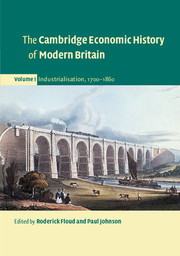Book contents
- Frontmatter
- Chapter1 Accounting for the Industrial Revolution
- Chapter2 Industrial organisation and structure
- Chapter3 British population during the ‘long’ eighteenth century, 1680–1840
- Chapter4 Agriculture during the industrial revolution, 1700–1850
- Chapter5 Industrialisation and technological change
- Chapter6 Money, finance and capital markets
- Chapter7 Trade: discovery, mercantilism and technology
- Chapter8 Government and the economy, 1688–1850
- Chapter9 Household economy
- Chapter10 Living standards and the urban environment
- Chapter11 Transport
- Chapter12 Education and skill of the British labour force
- Chapter13 Consumption in eighteenth- and early nineteenth-century Britain
- Chapter14 Scotland
- Chapter15 The extractive industries
- Chapter16 The industrial revolution in global perspective
- Bibliography
- Index
Chapter14 - Scotland
Published online by Cambridge University Press: 28 March 2008
- Frontmatter
- Chapter1 Accounting for the Industrial Revolution
- Chapter2 Industrial organisation and structure
- Chapter3 British population during the ‘long’ eighteenth century, 1680–1840
- Chapter4 Agriculture during the industrial revolution, 1700–1850
- Chapter5 Industrialisation and technological change
- Chapter6 Money, finance and capital markets
- Chapter7 Trade: discovery, mercantilism and technology
- Chapter8 Government and the economy, 1688–1850
- Chapter9 Household economy
- Chapter10 Living standards and the urban environment
- Chapter11 Transport
- Chapter12 Education and skill of the British labour force
- Chapter13 Consumption in eighteenth- and early nineteenth-century Britain
- Chapter14 Scotland
- Chapter15 The extractive industries
- Chapter16 The industrial revolution in global perspective
- Bibliography
- Index
Summary
INTRODUCTION
Sustained investigation of the economy and society of early modern Scotland has occurred only since the mid-1970s. Earlier generations were content to focus almost exclusively on the developments of church and state in the period before the Union of 1707. Out of this neglect came the widespread acceptance of an influential stereotype. It became a commonplace in the textbook literature until the 1960s that the Scottish experience was exceptional in relation both to England and to other ‘advanced’ European economies. Scotland in c. 1700 was said to be different, not only in its poverty, the archaism of the social structures and the timeless rigidity of the economic system, but also in its insecurity and instability, a direct result of weak central authority and the threat of baronial insurrection. In an article published in 1967 Hugh Trevor-Roper expressed the orthodoxy in succinct terms: ‘at the end of the seventeenth century, Scotland was a by-word for irredeemable poverty, social backwardness [and] political faction’ (Trevor-Roper 1967: 1,636).
Since then, however, a more complex and subtle evaluation of the national economic condition has emerged, as a growing army of Scottish historical scholars has asked fresh questions and plundered the archives in the search for answers. The corpus of published work has therefore grown significantly, though it has to be acknowledged that the recent historiography still lacks the sheer richness and density of the work on English economic and social history described at length throughout this volume. Key areas, such as demographic history, are constrained by the inadequacy of records.
- Type
- Chapter
- Information
- The Cambridge Economic History of Modern Britain , pp. 388 - 416Publisher: Cambridge University PressPrint publication year: 2004
- 6
- Cited by

